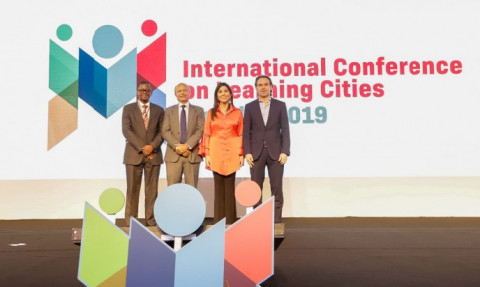
GCED Basic Search Form
Quick Search
أنت هنا
الأخبار

New strategy and fund to support lifelong learning programmes in cities around the world
With the adoption today of the Medellín Manifesto during the fourth International Conference on Learning Cities (ICLC), members of the UNESCO Global Network of Learning Cities (GNLC) pledged to boost inclusion in their communities in the coming years. The conference, whose theme, ‘Inclusion – A principle for lifelong learning and sustainable cities’, has set the path for a renewed focus on the so far under-researched challenges confronting vulnerable groups, showcased how lifelong learning policies and practices can support the development of inclusive, safe, resilient and sustainable cities.
The President of Colombia joined around 650 conference participants, including 50 mayors, as well as government representatives and experts from all UNESCO world regions, to discover how learning cities are investing in education that benefits everyone, including those often marginalized such as youth-at-risk, migrants, older people, digitally excluded populations and persons with disabilities.
Conference participants also adopted the future strategy for the UNESCO Learning Cities network and launched a fund to support lifelong learning programmes in cities around the world.
Colombia President Iván Duque Márquez underlined at the conference: ‘During the last decades Colombia has left behind times of pain and built hope. The education system of the country has developed substantially. We are making monumental efforts to change for the good of our country. I am proud that UNESCO is present here in Colombia with mayors and governors. I am proud to show participants a country that does not stop dreaming, that does not stop progressing, that does not stop growing.”
The fourth International Conference on Learning Cities was jointly organized by the UNESCO Institute for Lifelong Learning (UIL) and the City of Medellín.
Future strategy and fund launched for UNESCO learning cities
The future strategy of the UNESCO GNLC will run from 2019 to 2021. In order to strengthen the network and improve knowledge production and sharing, tools development, policy learning and capacity-development, seven thematic groups have been devised based on the issues and concerns deemed by members of the network to be of highest priority. A multi-donor funding modality will support this work.
David Atchoarena, Director of the UNESCO Institute for Lifelong Learning, emphasized during his closing comments at the conference: ‘UNESCO learning cities have tremendous power as drivers of inclusive education and sustainable development. They enable the change we need to provide each and every one of us with quality lifelong learning opportunities, and make sustainable development a reality at city level. Over the next two years, we will work with over 170 learning cities around the globe to develop solutions to issues such as sustainable development, inclusion, educational planning, health and well-being, and literacy. I invite all partners and donors to support this work by contributing to our newly launched fund.’
UNESCO learning cities success stories
In the run-up to the conference, 10 learning cities received the Learning City Award 2019 in recognition of their good practice in promoting quality education and lifelong learning opportunities for all: Aswan (Egypt), Chengdu (People’s Republic of China), Heraklion (Greece), Ibadan (Nigeria), Medellín (Colombia), Melitopol (Ukraine), Petaling Jaya (Malaysia), Santiago (Mexico), Seodaemun-gu (Republic of Korea), and Sønderborg (Denmark).
Federico Gutierrez, mayor of Medellín and co-host of the fourth ICLC, explained the key to his city’s success: ‘Only with education do we close the social gaps. Only with education do we overcome the vicious circle of violence and poverty. In Medellín, we invest in opportunities endorsed by its citizens. Medellín is a city that is known for rising from its darkest hours. Its people have found in education a possibility of resilience and transformation.’
URL:
http://uil.unesco.org/lifelong-learning/learning-cities/unesco-learning-cities-boost-inclusion
